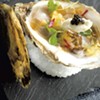Published February 10, 2011 at 1:32 p.m.
“Winter wonderland. Snow-dusted trees. Snow to my knees. Fluffy flapjacks in rivers of syrup, softly fried eggs, crisp bites of bacon. Juice.”
So tweeted Ruth Reichl shortly after her recent arrival in the frosty college town of Hanover, New Hampshire. Since Gourmet magazine closed in 2009, (ex-editor-in-chief) Reichl has become an editor-at-large for Random House. And a fellow at Dartmouth. And a public speaker. On Wednesday, she packed an auditorium so quickly for her Dartmouth talk, “Eating Our Word" that an overflow crowd assembled in a room across the hall.
Reichl is almost impossibly petite and fit-looking for someone known as the doyenne of modern food writing. She donned elaborate disguises during her days as a New York Times restaurant critic, but Reichl floated to the podium in skinny black trousers and a shimmery teal blouse. A mane of curly brown hair reached down to her chest. In a very New York voice, she asserted that food writing and cooking shows won’t be disappearing anytime soon — and in fact have not reached their zenith. Deflecting a suggestion that we’ve reached saturation with the whole food thing, she said the average restaurant review of 30 years ago was “terrible.” Instead, she said, bloggers have forced professional food scribes to polish their game. And after all, recording our history via the lens of food is vital and ancient.
To illustrate, Reichl romped through millennia of food culture, tracing early precursors of modern dishes (and attendant food writing) from ancient Greece and Persia to China’s Ming Dynasty. Then came Cvisinier François (the tome by famous French chef La Varenne) and France’s wholesale conquering of haute cuisine. America, by contrast, “is a nascent food society,” which helps explain our current culinary fever.
In her memoir Tender at the Bone: Growing Up at the Table, Reichl narrated the kitchen foibles of her mother, who would repurpose moldy bits from the fridge and once food-poisoned 26 guests at a garden party. “My mother’s generation abandoned cooking and…. my generation grew up with the most convoluted relationship to food,” she said yesterday, due to globalization and industrialization and all of the unappetizing things that happened to mid-20th-century food culture. “Cooking and eating were to be done with speed and efficiency.”
But a funny thing happened in the 1980s: Just as people were cooking less and eating out more, cookbook publishing exploded. The more distant we became from what we ate, the harder we tried — still try — to recapture that connection. After all, the average American uses only two recipes out of every cookbook they own. But, “[We] want to revel it, roll around in it, smell it and taste it. We’re destined to remain in the grips of a food obsession.”
And so, food writers should not have to apologize for their vocations, she said (good news for us), and she cited M.F.K. Fisher’s famous quote: “People ask me: ‘Why do you write about food, and eating, and drinking? Why don't you write about the struggle for power and security, and about love, the way the others do?’ . . . The easiest answer is to say that, like most other humans, I am hungry.”
Reichl finds in the great Fisher’s defense an apology where there needs to be none. And the shifting gender gap she’s noticed in the field is welcome. With the exception of Fisher and a few others, women have long been the recipe and tip-givers — yin counterparts to swaggering male chefs and scribes. But a robust new voice is emerging from American women food writers, one sometimes born in the heat and sweat of the professional kitchen.
Minutes after her lecture ended, Reichl was signing copies of her books for a long line of students and retirees, Hanover’s dual axes. She’ll be in town for a few more days as part of her fellowship. Though she comes to New England so infrequently that she has no favorite haunts, breakfast is clearly a favorite. “Mountains of snow thunder from the roof; blizzard in the sunshine. Big bowl of buttered oatmeal; cream, sugar, diced apricots. Warm now.” she tweeted the day after her lecture.
One or more images has been removed from this article. For further information, contact
[email protected].
More By This Author
Speaking of Blurt
-
Blurt Is No More. Here's Where to Find New Seven Days Content
Sep 17, 2012 -
Alice Eats: The Mill Market & Deli
Sep 11, 2012 -
Grazing at King Arthur Flour's Airy New Digs
Sep 10, 2012 -
Movies You Missed 55: Making Plans for Léna
Sep 7, 2012 -
Quiz: Ben & Jerry's Flavor or Porn Flick?
Sep 6, 2012 - More »
Comments
Comments are closed.
From 2014-2020, Seven Days allowed readers to comment on all stories posted on our website. While we've appreciated the suggestions and insights, right now Seven Days is prioritizing our core mission — producing high-quality, responsible local journalism — over moderating online debates between readers.
To criticize, correct or praise our reporting, please send us a letter to the editor or send us a tip. We’ll check it out and report the results.
Online comments may return when we have better tech tools for managing them. Thanks for reading.














































